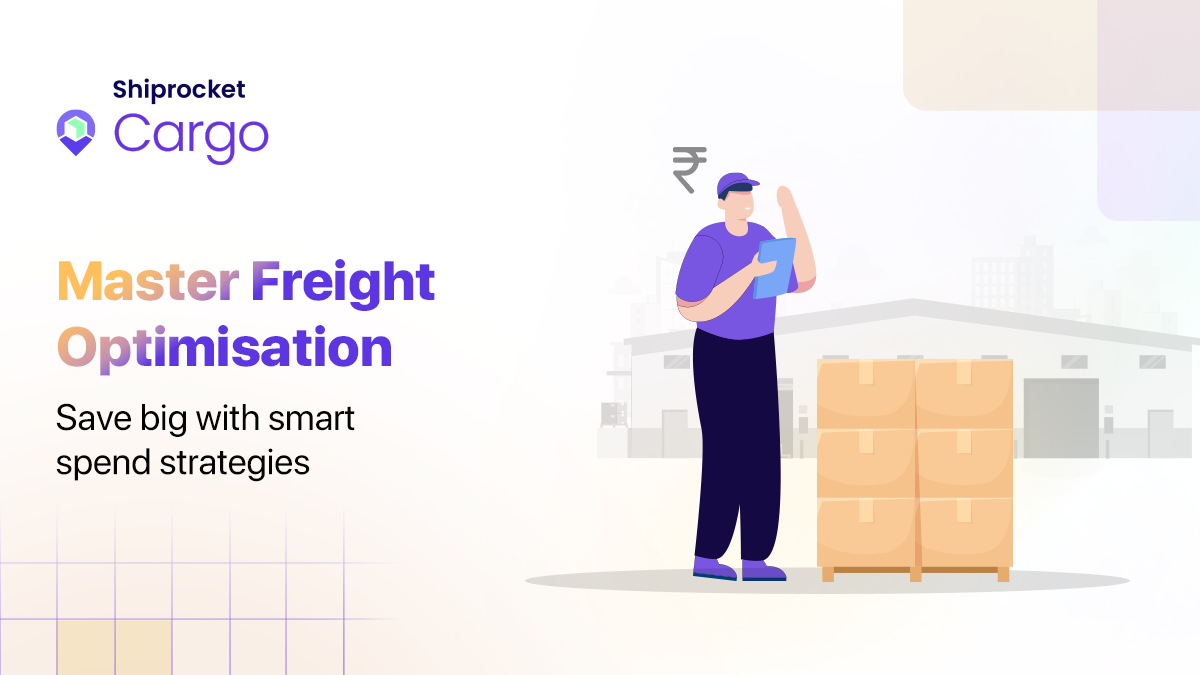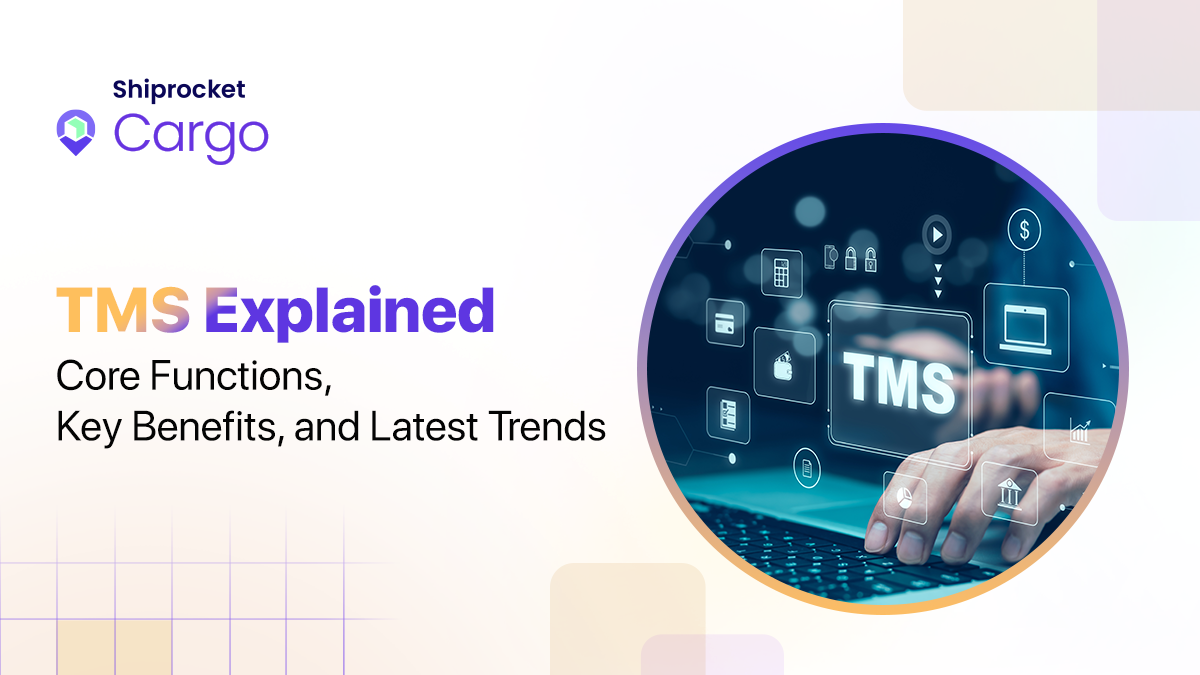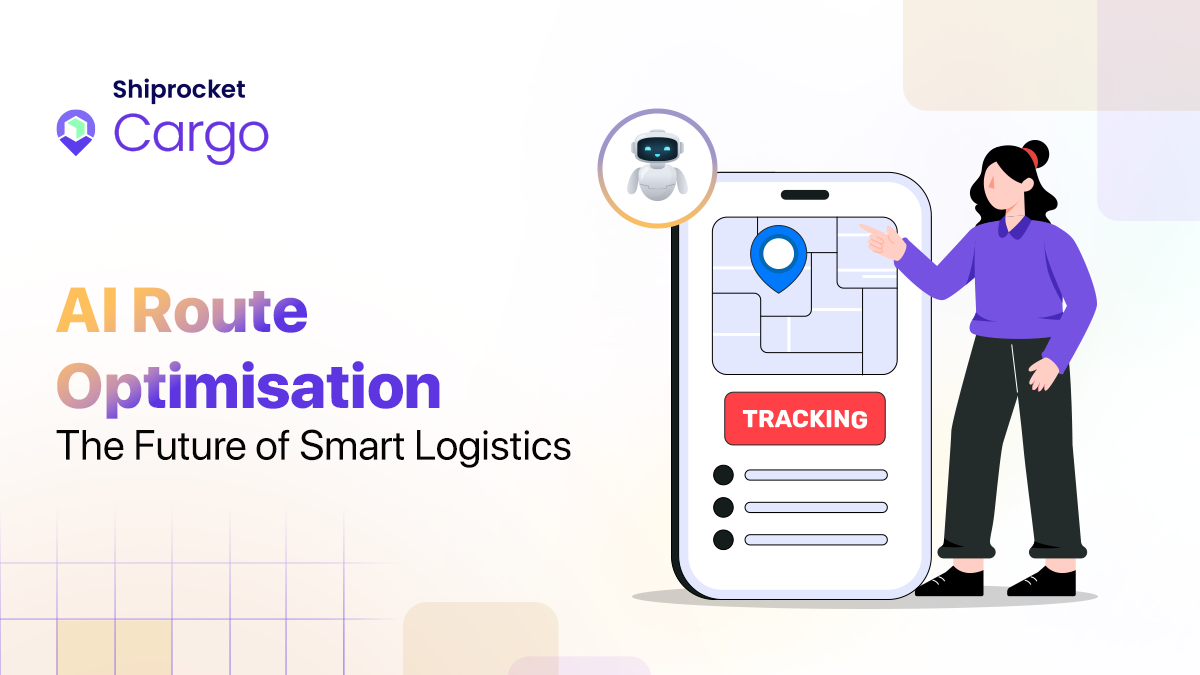Improve Operations with These 7 Logistics Workforce Management Tips
- Recruiting the Right Talent for Logistics Operations
- Empowering Your Distribution Center Leaders
- Keeping Your Logistics Team Motivated and Committed
- Promoting Talent from Within in Logistics
- When and How to Use Temporary Workers in Logistics
- Leveraging Technology for Smarter Workforce Planning
- How to Evaluate and Improve Individual Efficiency
- The Business Benefits of Effective Team Management
- How Shiprocket Cargo Enhances Logistics Team Performance
- Conclusion
Operational efficiency in the logistics industry depends on how effectively you manage your workforce. In recent years, supply chains have become quite complex, and customer expectations for quick and reliable deliveries have risen. These factors have made it essential for eCommerce businesses to optimise the performance of their logistics teams.
Several workforce management improvement practices can be adopted by eCommerce businesses to enhance productivity and improve service quality. In fact, oftentimes, it becomes difficult to implement the right workforce management strategy.
This blog will discuss the top 7 workforce management tips, their importance, and how eCommerce businesses can implement them.
Recruiting the Right Talent for Logistics Operations
Hiring the right talent to carry out your logistics operations involves several aspects of planning, allocating, and coordinating human resources, including the following:
- Strategic planning: You should be able to forecast the future needs of your workforce based on estimated business growth, changing technology, and seasonality.
- Skill assessment: This involves identifying and evaluating the necessary skills and experience required for various roles within your logistics operations.
- Talent acquisition: You can implement effective recruitment strategies to attract and hire a qualified workforce for logistics operations. You can do so via online groups, logistics-specific job boards, recruitment agencies, etc.
- Workforce development: Ensure that you assign employees to roles based on their skills and experience to further enhance productivity and minimise bottlenecks.
- Employee training: You must offer training and growth opportunities to employees. It will not only enable your employees to enhance their skills and knowledge but also help you create an adaptable and skilled workforce.
- Compensation benefits: Offering competitive salary packages and additional benefits can help you attract and retain top talent in a competitive job market.
- Performance management: Establish clear performance indicators and provide regular feedback to your employees. Implementing programmes can help you improve and ensure high-quality performance.
Effective workforce management in logistics leads to improved productivity, reduced costs, and operational excellence. It enables you to achieve logistics operational success by ensuring that you have hired the right people with the right skills and relevant experience.
Empowering Your Distribution Center Leaders
You want strong leaders in your organisation who can ensure the growth and success of your logistics operations. However, empowering your leaders may be a little more challenging than you think. You must provide the right tools, support, and autonomy to empower your leaders and improve performance in your distribution centers. Here are some ways to do so:
- You can equip your leaders with the confidence they need to lead distribution centers by providing them with relevant skills. Investing in leadership training can help your leaders enhance their skills in areas such as people management, data analytics, and conflict resolution.
- Ensure that your team leads have the necessary authority to make informed decisions. They should be able to do so without being micromanaged. It can not only help resolve issues faster but also with more accountability.
- Your leaders should have access to dashboards that provide real-time insights into their KPIs and performance data. This way, leaders can track progress and take corrective actions quickly and efficiently.
- In order to streamline logistics operations and eliminate data silos, enable and encourage your leaders to collaborate across different functions and departments.
- Well-trained and trusted leaders can reduce downtime, improve workflows, enhance their teams’ productivity, minimise costs, ensure safety, and boost morale. Make sure you encourage initiative and reward leaders who bring innovative ideas to your organisation.
Keeping Your Logistics Team Motivated and Committed
You’ll need more than a paycheck to keep your logistics team committed and motivated. You must invest in their training and development and create a culture of collaboration and teamwork. You must focus on clear communication, employee empowerment, and recognising their contributions. Prioritising balance and employee well-being can inspire your logistics team to achieve their goals. Let’s find out how you ensure commitment and reduce turnover:
- Make sure everyone is on the same page by regularly sharing expectations, goals, and updates with your logistics team.
- Don’t forget to involve your team members in the decision-making process. Delegating tasks can enable them to use their skills and experience effectively.
- Your employees must have real opportunities for growth in your organisation. You can do so by investing in training and development programmes, enabling them to enhance their skills and knowledge.
- You can offer support systems and flexible work arrangements to promote a healthy work-life balance.
- Create an inclusive and supportive work environment to encourage your employees to collaborate with other teams, fostering teamwork in your organisation.
- In addition to providing opportunities for innovation and growth, you can set challenging goals to inspire your logistics team to aim for excellence.
- Acknowledge and celebrate both big and small achievements of your employees. It can help you boost their morale and keep them motivated.
Promoting Talent from Within in Logistics
Promoting talent from within your logistics team can offer several benefits, including time savings, lower hiring costs, strengthening employee performance, and creating a more engaged and motivated workforce.
Here are some key points to consider when promoting talent from within your logistics team.
- You may want to keep your employees’ skills up to date with the latest industry trends and technologies. That’s why it’s essential to offer ongoing training and development opportunities.
- In addition to creating a culture of continuous learning, you must offer your employees a clear path to progress in their careers.
- You must keep your employees engaged through effective mentorship. Setting up a mentorship programme can help less experienced employees learn from more experienced ones. You can foster a culture of innovation by encouraging them to experiment with new ideas and solutions.
- Your employees should have numerous opportunities to develop new skills and acquire knowledge. It can help them both advance in their careers and transition into new roles.
- Conducting regular performance evaluations and providing constructive feedback is also essential. A performance management system can not only help you track employee performance but also identify areas for improvement and growth, motivate employees, and manage career development.
- Other important aspects of promoting talent from within your logistics team that not only boost employee satisfaction but also improve retention include open and honest communication, flexibility, and a work-life balance.
- Acknowledgement, recognition, and rewards can help you recognise your employees’ contributions and further motivate them.
When and How to Use Temporary Workers in Logistics
Temporary employees are a great, cost-effective way to handle special projects that have higher demand during peak seasons and staffing gaps. However, you must hire temporary workers strategically if you really want to leverage their advantage. Hiring temporary workers at the right time, especially when you’re experiencing fluctuating workloads or unexpected issues, and scaling up your logistics operations quickly can prevent you from putting extra strain on your core team and compromising efficiency.
Here are some points you should remember in terms of when and how to use temporary logistics employees:
- Start by clearly defining the roles and responsibilities of your temporary staff.
- Assign experienced mentors to provide adequate training to perform their duties effectively and safely. Though you should focus on training them quickly, it should also be thorough.
- Partner with reputable recruitment or staffing agencies. They can help you simplify the recruitment and onboarding process and give you access to a pool of skilled and experienced individuals.
- Ensure that both temporary and permanent employees communicate clearly and collaborate regularly.
- Regularly evaluate the performance of your temporary employees and adjust your plans accordingly. It can also help you assess your future need for temporary workers.
- Offer competitive salaries and benefits to attract more qualified staff, even if it’s for a temporary role.
There are several benefits your business can enjoy by hiring temporary workers. Reduced overtime, increased capacity, cost control, and a trial for employees you may hire in the future are only a few of them.
Leveraging Technology for Smarter Workforce Planning
Here’s a complete breakdown of how technology can ensure smarter workforce planning in logistics:
- Use historical data and machine learning to forecast future staffing needs based on demand and other relevant factors.
- Integrate HR data to gain a clear, real-time view of the workforce and its capabilities.
- You can utilise technology to design schedules that perfectly align with the forecast model. It can help you maximise efficiency and reduce labour costs.
- You can ensure accurate payroll and compliance by implementing automated systems that let you track time and attendance.
- Leverage technology for task management and workflow automation to improve efficiency and reduce errors.
- You should also enable your employees to view their schedules, track time, and even communicate with their supervisors.
- Utilise communication tools to foster open communication and collaboration among teams.
- Implement tools for gathering feedback on employee satisfaction and workload, enabling continuous improvement.
- Using technology can also help you analyse your employees’ skills and identify any gaps in experience or knowledge.
- One of the most effective ways to develop and track employee development plans is by using talent management systems.
- You can utilise workforce management software to automate repetitive tasks and streamline processes, resulting in reduced administrative burdens.
- Use technology to monitor risk factors and data analytics to identify trends, track and measure employee performance, make data-driven decisions, and develop contingency plans.
How to Evaluate and Improve Individual Efficiency
Here are some proven methods for evaluating and improving the performance of individual employees.
- You should clearly define what individual efficiency means for you in your logistics operations. It can be on-time delivery rates, order accuracy, productivity targets, etc. You can do so by establishing specific, measurable, achievable, relevant, and time-bound (SMART) goals for each individual within your logistics team.
- You can use performance management systems to gain access to data that will help you track individual performance against established metrics. Performance management systems are also great for automating data collection and analysis.
- Offer frequent, constructive feedback to employees, both positive and corrective, to guide their development and improve their performance.
- Leverage technology like warehouse management systems (WMS) and transportation management systems (TMS) to automate processes, track performance, and provide real-time visibility into operations.
- Although ongoing training is essential for growth, skill, and knowledge development, it is also crucial to hire individuals with the necessary skills, experience, and aptitude for logistics roles, especially in areas such as technology and safety.
- Encouraging cross-training among your warehouse workers is essential, as it can help you create a flexible workforce that can handle multiple tasks efficiently.
- Your warehouse should have a lean and efficient layout. It’s essential if you want to minimise movement time and streamline operations.
- Optimise the flow of goods from receiving to shipping to minimise delays and improve efficiency.
- Implement automation solutions, such as robotic systems and automated guided vehicles (AGVs), to automate repetitive tasks and free employees for higher-value activities.
- Implementing safety measures is not enough. You can create an efficient and safe work environment for your employees only when you prioritise safety training.
- Establish clear communication channels between different departments to ensure a seamless flow of information and coordination.
The Business Benefits of Effective Team Management
Improving workforce management in your logistics can offer several benefits to your business, including the following:
- When you value, support, and empower your employees, they are more likely to be engaged in their work and motivated to perform better.
- One of the biggest benefits of effective workforce management in logistics is better coordination and collaboration across different teams and departments in your organisation. This can help you improve overall efficiency, reduce errors, and offer faster delivery times to your customers.
- A collaborative team can help you strengthen your relationship with suppliers, leading to improved communication and enhanced services.
- Effective workforce management in logistics requires you to optimise processes, reduce waste, and improve resource utilisation. These can significantly contribute to reducing operational costs.
- If your logistics team is highly skilled, it can offer greater visibility into your supply chain processes. This helps you solve problems and make informed decisions.
- To make your workforce management effective, you have to identify potential risks and develop contingency plans, especially if you want disruptions to have a limited to minimal impact on your logistics and overall supply chain operations.
- When your logistics teams have clearly defined roles and responsibilities and effective communication channels, they are more likely to make better decisions based on actual data and actionable insights.
- A well-managed logistics workforce can help you enhance customer satisfaction. They make it possible by offering consistent and reliable service, ensuring your customers receive the high level of care and attention they expect.
How Shiprocket Cargo Enhances Logistics Team Performance
Do you still find optimising your logistics for bulk and heavy shipments complex? Shiprocket Cargo is a tech-enabled solution that can help you automate logistics workflows, reduce costs, and gain deep visibility into each shipment. Our B2B cargo shipping solution comes with advanced features that are tailored to enhance your logistics team’s performance and facilitate data-driven decision-making. We can simplify every step of the shipping process by offering nationwide coverage. Here’s how:
- Automated Workflows: Minimise manual effort with seamless shipment creation, carrier selection, and label generation, and you can do it all from a single dashboard.
- Smart Carrier Selection: We empower you to select the best courier based on performance, cost, and delivery timelines with our AI-driven recommendations.
- Real-Time Tracking: Keep your team and customers updated with live order tracking from the moment it’s dispatched to when it’s delivered.
- Dedicated Customer Support: You can take advantage of our reliable customer support at any time. We ensure that your issues are resolved quickly and that your business operations continue uninterrupted.
- Integrated Systems and Data Sync: Data silos can hamper collaboration and decision-making. We can help you avoid this situation and improve coordination by enabling you to effortlessly sync Shiprocket Cargo with your existing platforms, including ERP like SAP and Navision.
Conclusion
Enhancing logistics operations through strategic workforce management is not only beneficial for your eCommerce business but also essential.
Implementing best practices and improvement strategies, such as real-time performance tracking, continuous training, and flexible scheduling, can help you build a resilient and efficient logistics team.
These strategies not only improve operational efficiency but also empower your workforce, leading to sustained success in the competitive logistics industry.



